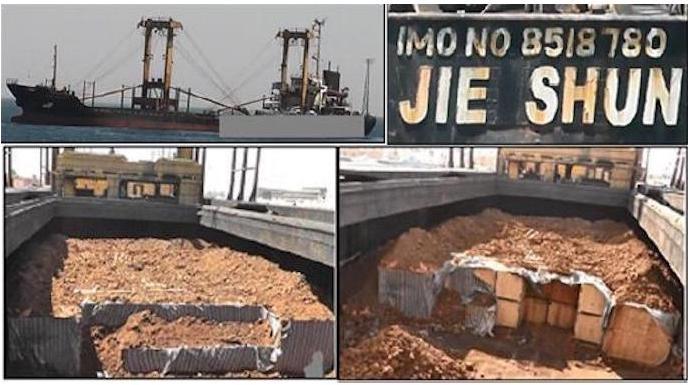Egypt’s effort to sneak in over $20 million worth of North Korean military hardware in violation of United Nations Security Council-backed sanctions has strained relations with one of its most crucial allies—the United States.
A United Nations report from late February describes in detail the shipment of rocket-propelled grenades that has spurred an international incident but the report leaves out a crucial fact now uncovered by The Washington Post.
At the center of the controversy is the Jie Shun, a ship owned and operated by people with a dubious history of skirting U.N. sanctions.
The ship’s journey began at Haeju port, North Korea on July 23, 2016, and ended 20 days later when it was intercepted by Egyptian authorities on Aug. 11.
Besides originating in North Korea during a time of unprecedented trade restrictions, the ship also aroused suspicion during its journey by trying to hide itself from detection.
“The vessel’s automatic identification system was off for the majority of the voyage, except in busy sea lanes where such behavior could be noticed and assessed as a safety threat,” notes the U.N. report.
When it was finally seized and inspected, the Egyptians quickly discovered that underneath a layer of iron ore that appeared to fill the ship’s cargo hold, were tarps covering 79 crates containing 24,384 disassembled PG-7 rocket-propelled grenades and materials for 4,616 more.
The weapons were made in North Korea, states the report.
The shipper used a variety of other ways to hide the shipment, including a bill of lading claiming the crates contained “assembly parts for the underwater pump” that were loaded in Nanjing China.
But the shipper also tried to trick its intended buyer, notes the report.
The markings on the weapons indicated they were made in February 2016 but “on-site analysis revealed that they were not of recent production but rather had been stockpiled for some time.”
The shipper, listed as Dalian Haoda Petroleum Chemical Co., also tried to hide information written on the crates themselves by covering them with large canvas patches.
The Washington Post revealed in a report Sunday that the name of an Egyptian company was stenciled on the crates.
The U.N. report made no mention of the intended recipient of the weapons but did note: “The destination and end user of the equipment was investigated by the Egyptian general prosecutor.”
The irony of the situation and its real political dimenions was captured by Andrea Berger, a North Korea specialist who cites King’s College London as her employer on Twitter, but is often quoted as a senior research associate at the Middlebury Institute of International Studies at Monterey, California.
“Egypt interdicted its own consignment of illicit North Korean weapons, and looked like the good guys for a year. Because that was better than letting Egypt keep those weapons. North Korea policy is a world of least-bad options.”
Egypt interdicted its own consignment of illicit North Korean weapons, and looked like the good guys for a year. Because that was better than letting Egypt keep those weapons. North Korea policy is a world of least-bad options.https://t.co/BxCrRz4fjT
— Andrea Berger (@AndreaRBerger) October 2, 2017
The Washington Post said that the shipment is behind recent tensions between the United States and Egypt.
According to officials who spoke to The Washington Post on condition of anonymity, the Jie Shun incident is one of many secretive deals behind the Trump administration’s decision over the summer to freeze nearly $300 million in military aid to Egypt.
The post said it is unknown whether North Korea was ever paid for the rocket ship, worth approximately $23 million.
For its part, Egypt claims to be cooperating with U.N. officals in finding and destroying the weapons. A statement the Egyptian Embassy in Washington gave the Post claims it is following all the rules.
“Egypt will continue to abide by all Security Council resolutions and will always be in conformity with these resolutions as they restrain military purchases from North Korea,” the statement said.


